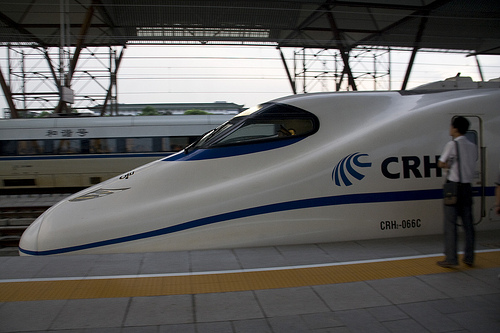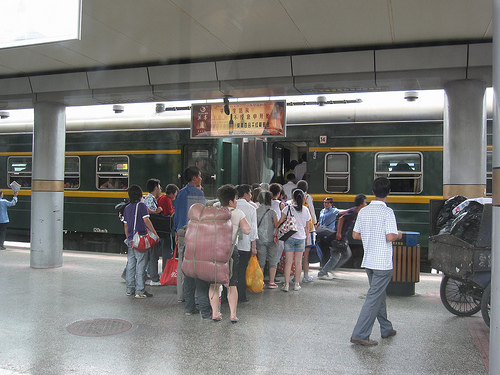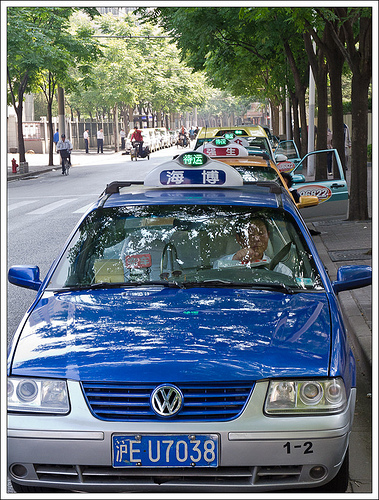Check out our Top Rewards Cards to boost your points earning and travel more!
Readers have requested a re-print of The Rapid Traveler’s 10-day Beiing-Xi’an-Shanghai itinerary for Frugal Travel Guy. First up, general China tips:
General tips:
- Bring Lonely Planet China, the maps and Chinese translations are invaluable. I can’t replace the guidebooks, but below I try to help with routing and selection.
- Guide for Beijing: a number of my colleagues have used Jenny Kwo (jennykwuo@yahoo.com.cn; +86 133 9162 6989) and always had positive experiences. She arranges what you need and does not play games. She could help with the train tickets in addition to the Great Wall day. She might also be able to help with Xi’an if you want a guide and/or car.
- Flights: the Chinese government sets a maximum for domestic prices and guidelines for how much airlines can discount from that. If you use international websites you will be charged the full-fare, which is flexible to change but quite high. Instead book on either ctrip or eLong (owned by Expedia), both will quote virtually the same prices and will have significant discounts. They price the lowest fare but if you want more flexibility, each flight has an option to see the different fare classes with explanations of the fare. It used to be a pain to use foreign credit cards on these sites, but it should be ok now. Travelzen is a new player and can be used as a backup.
- Trains: For Beijing to Xi’an, you want to be on the Z19 at 19:57-07:50 from Beijing West Station (NOT Beijing Station in the center of town; the West Station does not have good metro links so take a taxi). The evening T7, T75 and T43 are ok backups, but take an extra hour. The ‘Z’ prefix means a nonstop, ‘T’ means an express. You want the ‘soft sleeper’ tickets, all 4 for a compartment. The guide will need to get the tickets in advance, typically available 7 days in advance but the rules are always changing. Tickets do not require any name or ID. It is a risk to wait until arrival for such a popular route. If it somehow falls through, last minute flights are not expensive because of the government ceiling on flight prices for each route. The train stations are big and bewildering, but the Z trains only sell assigned seats, not the ‘seatless’ seating of slower trains, so are less crowded, and have a nice dinner car. Make sure to find the light and volume switches or you will be jarred awake very early.
- Safety is a non-issue, except to watch pickpockets in crowded areas like the metros and tourist sites. Lock backpacks and/or wear them on your front.
- Scams: the main scams involve ‘art students’ taking you to their exhibition and then hard-selling you. ‘Tea tastings’ are another common scam. In main tourist areas beware anyone approaching you with good English.
- Bargaining: it can sometimes be hard to tell whether to negotiate or not. Generally markets and souvenir stores around tourist sites are open for fierce negotiation (start about 10% of the initial offer and go no higher than 25% to 35%, quantity of purchase helps beat the price down). Restaurants, convenience stores, department stores, more formal places like that are not open to negotiation. No harm in trying, though you might be stared at in disbelief if you try to negotiate your Starbuck’s fix.
- Credit cards: only high-end restaurants, high-end stores and hotels accept foreign cards. Even if the window has a Visa/Master logo, that may only be for China cards. Use ATMs or bring enough cash for daily spending, shopping and things like train tickets. Some ATM cards a free of fees, like BofA cards used on China Construction Bank ATMs and HSBC Online Bank cards on HSBC ATMs. USD cash needs to be in superb condition to exchange, new bills are best. No gold dollar coins. Government set the rates and the only commissions are at the airport and private exchange stands in tourist areas. Your hotels will exchange at the government rate for no fee. Banks are slow.
- Hours: most businesses and restaurants are open early and stay open late (laters in Shanghai than Beijing or Xi’an), but tourist sites often close by 5 or 6 with last tickets sold an hour before.
- Taxis are reliable, cheap and generally honest, but it is critical to have your destination written in Chinese. Taxis go by the meter, unless you are negotiating a day trip. Some cities add surcharges that don’t show on the meter, like 1 RMB fuel surcharge, but you should be given a separate receipt and the amounts are minimal. You might have some issues with dishonest taxis in Xi’an; if they don’t use the meter, get out and find another.
- Traffic is a big challenge, especially in spread-out Beijing. In Beijing and Shanghai rely on the superb metro network for all but the places on the outskirts of the city.
- Restaurants: there are great restaurants all over and the guidebooks all have excellent recommendations that accommodate English speakers to varying degrees. It generally pays to find something suitable nearby rather than schlep all over the city looking for a particular restaurant. Chinese are obsessed with food and just about any intersection will have several good choices. In the below I will only mention a few restaurants/nightlife areas, if you want more, I can provide more based on your interest.
- Traditional entertainment: each city has shows, mainly for tourists, of acrobats, traditional opera, etc. I don’t have much to say about them, except one acrobats show is probably worth it. Hotels in Xi’an will hard sell on some shows. The Shanghai Acrobats are very good.
- Massages/spas: plenty of good ones around, some provide extra services you might not be in the market for. Not always easy to tell which is which, but generally high-end ones with bright storefronts that look professional/clinical will be better. Dim with purple neon on the exterior are not. Oriental Taipan, with locations in both Beijing and Shanghai, is excellent and not terribly expensive.
Readers, please share your China tips!
Check Out Our: Top Rewards Cards ¦ Newsletter ¦ Twitter ¦ Facebook ¦ Instagram



